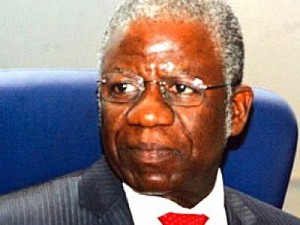Revisiting The Oronsaye Report
Articles/Opinion Sunday, January 19th, 2014
By Adewale Kupoluyi
It is disheartening that Nigeria, being the sixth largest exporter of crude oil in the world, still has over 70 per cent of its estimated 170 million population tagged as being poor and living below the United Nations poverty threshold of $2 per day.
It is in our country that more than 70 per cent of its national resources are channelled into running a government that is unduly large and cumbersome to manage, while leaving behind, less than 30 per cent for the execution of capital projects and debt servicing.
It is still my dear country that continues to promote a bogus and corrupt system that can never bring about any development because we keep consuming and consuming and producing little. Our country is a nation that runs a bicameral legislature that is notorious for being the highest remunerated in the world, where the embarrassing high rate of unemployment is at the dismal bottom position and the attainment of all the known human development indexes such as the United Nations Millennium Development Goals MDGs by 2015, which is barely a year from now, remains a mirage.
As a way out of the quagmire, the Goodluck Jonathan administration came up with the idea of setting up the Presidential Committee on the Rationalisation and Restructuring of Federal Government Parastatals, Commissions and Agencies, under the leadership of the well-respected, retired civil servant and former Head of Service of the Federation, Stephen Oronsaye, which at the end of their painstaking assignment, recommended the scrapping and merging of 220 out the existing 541 government agencies.
The Oronsaye committee had proposed the reduction of the size of government to a manageable level and the streamlining of the operations of its various organs for efficient service delivery and cost reduction. Not only did the Federal Executive Council met to deliberate on the report, a White Paper was allegedly produced while the Adamu Fika-led committee reviewed the report.
Unfortunately, the Federal Government appears to have dumped the report, which recommended the drastic reduction in the number of government Ministries, Departments and Agencies, because the Medium Term Expenditure Framework and Fiscal Strategy presented by the Presidency to the National Assembly point to the fact that all the money-gulping MDAs were still provided for in the controversial 2014 budget to the tune of about N200 billion.
This development is nothing short of a clear demonstration of the government’s lack of political will to implement policies that can impact positively on the economy as well as the polity. The two untenable reasons that had been given for the inability of government to implement the findings of the committee are: the money to be saved from the exercise is negligible and so does not worth the stress and secondly, the legal framework is not in place for its implementation. Certainly, the reasons are not convincing to any discernible mind and the mindset of many Nigerian that these MDAs are nothing other than wastages, economic burden and sheer duplication of bureaucracies and an avenue to create ‘food for the boys’ through other means.
Then, if this is the case, why do we really need to waste money and precious time setting-up a committee when its outcome will never be implemented just like the Orosanye report is turning out to be? While the detailed work of the committee – that cuts across virtually every aspect of Nigerian public administration – deserves commendation, another look at the education component of the report – which when implemented, could bail out this critical sector from its near collapse.
These include the provision of compulsory and free education from primary to junior secondary schools for all school-age children in the country; the need for critical stakeholders, such as the National Council on Education, to make tangible efforts to revamp the falling standard of education in Nigeria; the imperative for state governors to be engaged, through the National Economic Council of State to drive the process and restore the standard of primary and secondary school education; professionalization of teaching; need for practicing teachers to undergo in-service training to enable them garner renewable teaching license; while teachers in privately-owned primary and secondary schools should be made to pass a qualifying examination before they are re-certified.
The report also made case for an appropriation of funds for the management and development of schools, which should be allocated to them directly, rather than being warehoused at the Federal Ministry of Education, Universal Basic Education Commission and State Universal Basic Education Board; need for the restoration of a strong, aggressive, focused and professionalized Inspectorate Division that would facilitate the improvement and maintenance of standards in service delivery; and the institution of decisive and courageous leadership for the sector.
With the government’s posturing, the report might have reached the end-of-the-road, meaning that we are still from overcoming our perennial and wasteful spending on bureaucracy, as the current deficit budget proposal before the National Assembly, indicates that the nation is set to spend N4.6 trillion while revenue profile is pegged at N3.7 trillion. One does not need any soothsayer before being told that the fiscal budget provides barely any reason to expect meaningful development in terms of either infrastructure or human capital this year.
To worsen matters, the cost of debt servicing will jump up from N591.76bn in 2013 to N712bn, consisting of N663.61bn for the servicing of domestic debt and N48.39bn for servicing the foreign component coupled with controversial embedding of many, indefensible, self-serving projects for the political elite such as the provisions of a new private jet, which would increase the Presidential fleet to 11!
The comatose situation in the nation calls for a fiscal philosophy that should vigorously tackle corruption, waste, inefficiency, poor governance, bloated bureaucracy and inequitable distribution of wealth. Hence, implementing the report is capable of returning the economy to the path of restoration and rejuvenation.
As observed by one of my readers, there is “the need to revisit the Steve Oronsaye Committee recommendations on the merger and scrapping of some Federal Agencies and Commissions which have conflicting and duplicating mandates. Obviously, some of these MDAs exist as drain pipes on the economy. Some of them were set up just for political reasons. The money that will be saved from the scrapping and merging of these agencies can be used to set up industries in each of the geo-political zones of the country. These industries will be self-sustaining and without any yearly budgetary allocations. So many Nigerians will also be employed by these industries”. I can’t agree with her less.
Kupoluyi writes from the Federal University of Agriculture, Abeokuta, vide, adewalekupoluyi@yahoo.co.uk, Twitter, @AdewaleKupoluyi
Related Posts
Short URL: https://www.africanexaminer.com/?p=7397




















